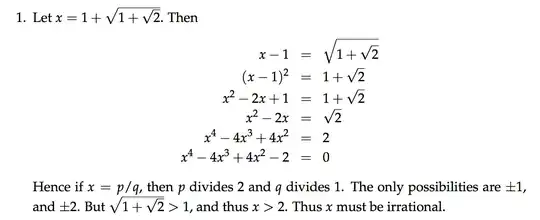Here is the solution to a problem in which I am supposed to prove x is irrational. However, I don't understand why it is true that p divides 2 and q divides 1. Where is this coming from?
-
2https://en.wikipedia.org/wiki/Rational_root_theorem – Joey Zou Aug 10 '16 at 03:23
-
The proof is (incorrectly) applying the Rational Root Test. The (common) error is that $,p,q,$ must be coprime for the test to apply. Here we can satisfy that hypothesis by assuming that the fraction is reduced, i.e. in lowest terms. This may seem a pedantic critique, but it can lead to serious errors if one is not careful (esp, in more general rings). – Bill Dubuque Aug 10 '16 at 03:27
3 Answers
If you've taken abstract algebra, you've seen this result before. If you have a polynomial $a_nx^n + \cdots + a_1x+ a_0$ then the set of rational roots are of the form $r/s$ where $r \mid a_0$ and $s \mid a_n$.
- 8,938
Suppose $1+\sqrt{1+\sqrt{2}}$ is rational, then $\sqrt{1+\sqrt{2}}$ is rational, from here we conclude $(\sqrt{1+\sqrt{2}})^2=1+\sqrt{2}$ is rational. From here we conclude $\sqrt2$ is rational. Let $\sqrt{2}=\frac{p}{q}$ with $p$ and $q$ coprime, we conclude $2p^2=q^2$, we conclude $q$ is even, so $q=2k$, then $2p^2=4k^2\implies p^2=2k^2$, so $p$ is also even, a contradiction!
- 105,651
-
This is the way I would of done it, but I'm guessing this came from an algebra course. Either way, it never crossed my mind to pair checking rational or irrational using the rational roots theorem. – Faraad Armwood Aug 10 '16 at 03:26
If $x=p/q$ with non-zero co-prime integers $p, q,$ and $x^4-4x^3+4x^2-2=0$ then $$2q^4=p(p^3q^4-4p^2q^3+4pq^2)$$ so $p| 2q^4,$ and since $\gcd (p,q)=1\implies \gcd (p,q^4)=1,$ we have $p|2.$.... And $$p^4=q(4p^3-4p^2q+2q^3)$$ so $q|p^4,$ and since $\gcd (p,q)=1\implies \gcd (p^4,q)=1,$ we have $q|1.$
Another method is to note that if $A\in Q$ and $B\not \in Q$ then $A+B\not \in Q$ and $\sqrt B\not \in Q .$ Because if $C=A+B\in Q$ then $B=C-A\in Q,$ and if $\sqrt B\in Q$ then $B=(\sqrt B)^2\in Q.$ Knowing that $\sqrt 2\not \in Q,$ we have $$\sqrt 2\not \in Q\implies 1+\sqrt 2\not \in Q\implies \sqrt {1+\sqrt 2}\not \in Q\implies 1+\sqrt {1+\sqrt 2} \not \in Q.$$
- 57,985
